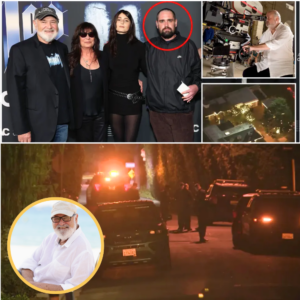In the enchanted corridors of literary legacy and Hollywood stardom, where spells of nostalgia clash with curses of conviction, a once-unbreakable bond has fractured into a saga as compelling as any Hogwarts house feud. On September 24, 2025, Emma Watson— the luminous Hermione Granger who grew from child wizard to global feminist icon—extended a tentative wand of reconciliation toward J.K. Rowling, the sorceress who conjured the world that made her famous. Speaking on the “On Purpose with Jay Shetty” podcast, Watson, now 35 and a UN Women Goodwill Ambassador, admitted the “really painful” sting of their rift over transgender rights, confessing her “deepest wish” to cherish their shared history without erasure. “There’s no world in which I could ever cancel her out,” she said, her voice cracking like a poorly cast Lumos charm. It was a moment of raw vulnerability from the woman who’d once tweeted fiery support for trans identities in 2020, declaring, “Trans people are who they say they are.” Fans, long divided between Potter purists and progressives, held their breath—could this be the Veritaserum truth to heal old wounds?
Rowling’s reply, landing like an Expelliarmus on September 29 via a blistering 700-word thread on X (formerly Twitter), shattered that fragile hope. In a response that’s been dissected more voraciously than a Slytherin plot twist, the 60-year-old author—whose net worth rivals Gringotts’ vaults and whose activism has made her a lightning rod—didn’t just rebuff; she revealed. “I’m so sorry for what you’re going through,” Rowling quoted from a handwritten note Watson allegedly sent her in 2022, amid the author’s torrent of death threats following her Baftas speech defending single-sex spaces. The irony? Watson had just amplified the backlash with her own public stand against Rowling’s views, yet believed a single line of sympathy—delivered via intermediary, despite having Rowling’s phone number—would suffice. “Emma had just publicly poured more petrol on the flames,” Rowling wrote, her words a cauldron of controlled fury. The thread, viewed over 67 million times and liked by 415,000, culminated in a 15-word dagger that left Watson’s camp reportedly speechless: “Adults can’t expect to cosy up to an activist movement that regularly calls for a friend’s assassination, then assert their right to the former friend’s love, as though the friend was in fact their mother.” It was a mic-drop moment, echoing through timelines and talk shows, reigniting the debate that’s simmered since Rowling’s 2020 essay on biological sex.
To trace this tale’s tangled threads, one must venture back to the Philosopher’s Stone era. Rowling, a single mother scraping by on welfare in Edinburgh, penned Harry Potter and the Philosopher’s Stone in cafes, weaving poverty’s shadows into tales of triumph. Published in 1997, it birthed a phenomenon: seven books, eight blockbuster films grossing $7.7 billion, a theme park empire, and a fanbase that spans generations. Watson, discovered at nine in a London stage school, embodied Hermione’s bushy-haired brilliance from 2001 to 2011, transforming from Oxford undergrad to A-list activist. Their bond bloomed off-screen—Rowling as mentor, gifting Watson early manuscripts and life advice; Watson as the daughter figure, crediting the series for igniting her feminism. “Jo was incredibly kind and encouraging,” Watson reflected in her podcast, praising the “words of encouragement” that shaped her. Reunions, like the 2021 Harry Potter 20th anniversary special, glowed with that magic—until the spells soured.
The schism erupted in June 2020, when Rowling tweeted mockery at the phrase “people who menstruate,” arguing it erased women in favor of inclusivity. Her subsequent 3,600-word essay expanded into a manifesto: defending women’s prisons, shelters, and sports from what she termed “gender identity ideology’s” incursions, rooted in her experiences with domestic abuse and healthcare. Critics, including GLAAD, branded it transphobic; supporters hailed it as feminist fortitude. Watson, alongside Daniel Radcliffe (Harry) and Rupert Grint (Ron), fired back. Watson’s X posts—”I want my trans followers to know that I and so many other people around the world see you, respect you and love you for who you are”—garnered millions of likes but drew Rowling’s ire. “She’s ignorant of how ignorant she is,” Rowling later quipped in a 2025 NBC interview, a barb echoed in her recent thread. Radcliffe penned an open letter to The Trevor Project, emphasizing trans safety; Grint told Esquire he felt “protectively” toward Rowling but disagreed fundamentally. The trio’s stands, amplified by their Potter pedigree, positioned them as moral arbiters of the Wizarding World, a role Rowling now decries as “de facto spokespeople” presuming obligation from their “former professional association.”
Watson’s podcast olive branch arrived amid shifting winds. On “On Purpose,” hosted by the ex-monk turned mindfulness mogul Jay Shetty, she unpacked the “complicated” pain of loving Rowling’s creation while rejecting her evolution. “I hope I can keep loving people who I don’t necessarily share the same opinion with,” Watson said, her eyes misting as she recalled Hermione’s rarity: “a girl character who was unapologetically herself.” She lamented the impossibility of dialogue—”I think the thing I’m most upset about is that a conversation was never made possible”—and rejected cancellation outright. “Full-throated condemnation of me is no longer quite as fashionable,” Rowling sniped in response, suggesting Watson’s thaw stems from trans rights’ cooling cultural cachet. Post-2020, Rowling’s stance has hardened: funding anti-trans lawsuits, like the UK’s 2024 Supreme Court case on sex-based rights, and amplifying voices like Sex Matters. Watson, meanwhile, has channeled her advocacy into HeForShe, her production company, and quiet philanthropy, stepping back from the spotlight after Little Women (2019).
Rowling’s thread, a masterclass in measured venom, peeled back layers long speculated. She disclosed declining media invites to shield Watson from hounding—”Ironically, I told the producers that I didn’t want her to be hounded”—and invoked her own hardships: “I lived in poverty while writing the book that made Emma famous.” The note revelation stung sharpest, painting Watson as tone-deaf: a multimillionaire at 14, shielded by wealth from the “mixed-sex public hospital ward” or “state-run rape crisis centre” Rowling fears. “Like other people who’ve never experienced adult life uncushioned by wealth and fame, Emma has so little experience of real life she’s ignorant of how ignorant she is,” Rowling eviscerated, listing scenarios Watson’s privilege precludes—homeless shelters, high-street changing rooms, prison cells shared with “male rapists who’ve identified into the women’s prison.” It was a gut-punch grounded in Rowling’s survivor ethos, contrasting her welfare roots with Watson’s silver-spoon ascent.
The fallout? A cauldron bubbling over. X erupted with #RowlingVsWatson trending globally, amassing 8 million mentions in 48 hours. Supporters flooded Rowling’s post with wizard emojis and “Team Jo” chants; critics accused her of bullying, with one viral TikTok edit splicing the thread over Harry Potter‘s Forbidden Forest scene, captioned “When Hermione fights back… but loses the plot.” Parodies proliferated: comedian Intel Lady’s spoof of Watson’s interview, where a Hermione lookalike fumbles spells while defending “all witches,” drew Rowling’s rare chuckle—”I’m here for ALL the spoofs.” Watson’s silence speaks volumes; sources whisper she’s “gutted” but plotting a measured reply, perhaps via essay or interview. Radcliffe and Grint, looped in Rowling’s missive as “co-stars,” stayed mum—Radcliffe busy with Weird: The Al Yankovic Story sequels, Grint promoting his Apple TV+ series. GLAAD decried Rowling’s words as “harmful escalation,” while feminist outlets like The Guardian pondered if Watson’s plea signals a broader fatigue with culture wars.
Beyond the personal, this clash illuminates deeper divides. Rowling’s crusade—bolstered by allies like Kathleen Stock and Maya Forstater—has reshaped UK policy, influencing the Cass Review on youth gender care and Scotland’s blocked self-ID bill. Her 14.5 million X followers form a digital Order of the Phoenix, crowdfunding women’s rights initiatives. Watson embodies progressive Hollywood’s evolution: from UN speeches to selective feminism, her HeForShe campaign now navigates minefields of intersectionality. Yet, as Rowling notes, “Emma is rightly free to disagree… but I have the same right.” The irony? Their feud, born of Potter‘s themes—tolerance, chosen family, fighting darkness—mirrors the books’ moral grayness. Fans, once united in cosplay and conventions, splinter: a Change.org petition for a “Potter reconciliation summit” hit 50,000 signatures, while anti-Rowling boycotts target her Cormoran Strike series.
As autumn leaves swirl like dementors’ cloaks, one wonders if mending is possible. Watson’s “I’m sorry” note, once a whisper of empathy, now echoes as hollow amid Rowling’s roar. The author’s closing zinger—that adults can’t demand maternal love after courting assassins—lands like Avada Kedavra: final, unforgiving. Yet in Potter‘s spirit, redemption arcs abound; perhaps time, like the Time-Turner, will loop them toward understanding. For now, the wizarding rift endures, a spellbinding reminder that even in fiction’s glow, real magic fractures. Dearest readers, in a world of wands and words, who wields the true power? The creator, the creation, or the courage to let go?

